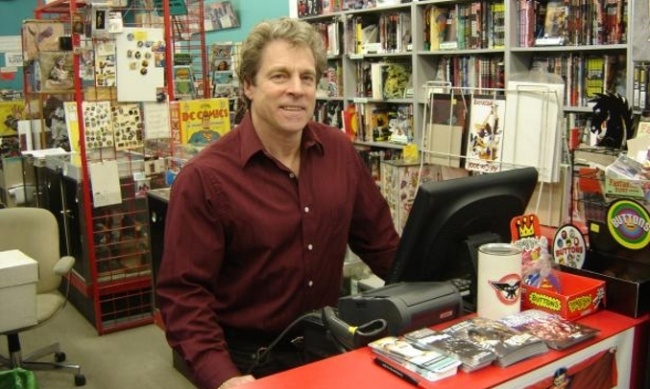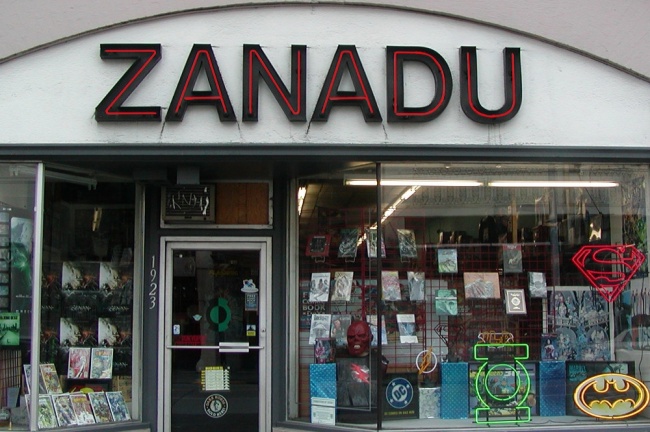Zanadu Comics in Seattle announced last week that it would close in January after 42 years in business. It had encountered tough times in the last few years, and ran a GoFundMe last year to raise money to try to keep the store in business (it raised $16,735). But efforts to turn things around were unsuccessful and the store is running a sale to liquidate inventory and will close for good on January 28, 2018.
Perry Plush opened his first comic operation inside of a used paperback store in 1975, at a time when there were probably a couple of hundred comic stores in the U.S., often in conjunction with used bookstores or other complementary retail, as was the case with Zanadu. Eventually the used bookstore was phased out and comics took over the whole space.
We talked to Plush (who calls himself "President and Janitor" of Zanadu Comics) about his store, the closing, and the comics business.
Were there other comic stores in Seattle when you opened?
Perry Plush: Yes. There was Golden Age Collectibles, which is still in business, and a few other stores. They've come and gone a lot. Then when there was the big surge with all the stores opening up with trading cards, at one time, there were probably over 70 stores in all the Seattle area.
It looked like last year you tried a GoFundMe. Is that when things were starting to get tougher?
This business has always been tough. You're always worrying about the next month and paying the bills for that month with the money coming in from the current week. I was just seeing the trends more and more. We're just losing our customer base.
Being an older store, my customer base is older. They were just dropping out. The comics weren't the comics that they grew up with. The characters weren't their characters. They were just dropping out. Prices kept going up. The customer base kept eroding.
Then all the other circumstances of what's going on in Seattle: people aren't shopping downtown; people are losing their jobs downtown. There used to be a lot of people working downtown, then all the businesses are just moving out of downtown.
I don't think the city's helping. They're taking away parking, buildings are coming down, new construction's coming up. What stores are able to stay here, nobody sells goods. It's all services. They're the only ones that seem to be able to survive down here.
Even the big stores, like Macy's, which is a block and a half away from us, their business is down so much that they're selling off floors of their building, upper floors. It's just not small business. It's just all businesses.
All retail businesses.
Right. They're just having to find different ways and different methods of selling and staying in business and keeping employees.
Is the higher minimum wage started to take effect there? Is that having an impact too?
Yeah, the minimum wage is way up. That's one of the reasons I was really, really looking at options because I take care of my people first. You've got to. When I'm making less than minimum wage..., then you really, really, really have to look at things.
Costs are up. Sales are down. That's not a good combination.
Nope. As a self‑employed [person], you have to really, really work hard to be able to get your financing and stuff going. Little by little, I've gotten credit lines and such. That's somewhat of why we've been able to stay open with borrowing on these credit lines, paying it back, borrowing, and paying it back.
The GoFundMe was great. It's really an emotional thing to have to ask for help because this business is all me. Nobody else can come in. I've taken stores that I've had and sold to somebody else. Now those stores are gone. Every store has its own personality. That personality is pretty much the person that owns it.
You had two stores for a while. UD, is that University District?
Yeah. I did have one there. I've had three stores. We've tried other stores in other areas. It's just the customer base of comics, I think if you open another store, you cannibalize your own customer base because it ends up half of the base of the new store is customers that were coming to your original place. You got to watch the times and what's going on, but you have to have options.
You’re just going to liquidate all the inventory?
I'm closing the store, but I'm really going to keep the business. When I talked about options, I've been doing online sales of back issues. Back issues pile up over the years. I've been doing OK with that on Atomic Avenue, which is an offshoot of ComicBase, which is an inventory system. I'm going to probably be doing that.
I've got too much comic book ink in my blood to stay away from comics too long. I just feel like I'm morphing into something new.
With this business, you have to keep reinventing yourself. Used book store, or book store and esoteric store, toy store, whatever works for you that time. That's whatever you have a passion for. If you don't have a passion, you would have been gone a long time ago.
Any observations on changes in the business? You've been in the business a long time, from the very dawn of the direct market to now. Any observations on the changes?
I think that the publishers have to focus on what they really want to do and get away from all the gimmicks and continued crossovers and storylines and such because they've spread everything so thin. They've spread themselves so thin that they no longer have a market to sell their comics to the public.
They've already learned that digital is not going to solve anything. The main book store chains are going out. They don't sell comics. They want to sell graphic novels. You can't have graphic novels without the comics, I believe, because who's going to spend $20, $30 on a book that they don't know about?
We've always considered ourselves a full line comic store, but it got to [a point] we could no longer order all these comics from these publishers, even one copy or something like that. We had people that wanted it, but the logistics, it was just too much there. It was all buried.
I think you just need to cut the lines in half and really focus on the main characters and give a full story with a beginning, middle, and an end, every issue. They did it for years, and now you've got to deal with talking heads and wait till the next issue. Then you don't get anything solved in that, the next issue.
People don't have the time or the energy to do that. Once you get behind, that's it. There's other things to do. With comics, you have to work at it. It's not something you can just pick up, "Oh, this is cool."
You've got to have that interest and that passion to read it and really get into it. Then, "Oh, this is interesting, and, look, this character comes from over here." Then you can go over to there and see what's going on. People just expect it all to be handed to them. With comics, that doesn't seem to happen.
That's on the content side. What about on the business side? Any observations on the changes there?
I think it's hurt that we can't get stuff from other places with this because we can't really change prices. A restaurant can raise its prices. We can't. With the comics come in at that price, we have to sell them at that price. Or you get discount and then you're just making a cycle that you're getting deeper in the hole.
I've dealt with almost all the distributors. I thought that was great because I had to work at it, but I was able to get comics every week, sometimes ahead of other stores, because I worked with every distributor.
In this business, you really have to know the people that are doing it. You should be in ComicsPro, in any of the associations. Go and meet these people. Meet the publishers and find out who's in charge and who's doing what so you have a contact in case you want to do something on your own, they’ll also know who you are.

RIP Zanadu Comics, Seattle
Posted by Milton Griepp on November 21, 2017 @ 12:20 am CT



